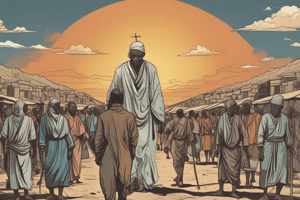Podcast
Questions and Answers
Summarize the information provided by Trevor Noah before his chapter begins on page 33.
Summarize the information provided by Trevor Noah before his chapter begins on page 33.
Although most South Africans would consider themselves to be Christians, they still strongly believe in old superstitions, casting spells, putting curses on one's enemies, etc.
Why does Trevor refer to his grandfather, Temperance, as eccentric, and why did they not see him often?
Why does Trevor refer to his grandfather, Temperance, as eccentric, and why did they not see him often?
He didn't see his grandfather often because he and his grandmother were divorced. He lived with his second family in the Meadowlands. He had wild mood swings and had been a boxer in his youth. The family later found out he was bipolar.
How does Trevor characterize his grandmother, Francis Noah?
How does Trevor characterize his grandmother, Francis Noah?
She was the family monarch who ran the house, looked after the kids, and was described as barely 5 feet tall, hunched over from factory work, but very active.
Describe Koko, Trevor's great grandmother. Why didn't he think of her as a real person when he was little?
Describe Koko, Trevor's great grandmother. Why didn't he think of her as a real person when he was little?
Explain the role of religion in Soweto during apartheid.
Explain the role of religion in Soweto during apartheid.
What is a prayer meeting?
What is a prayer meeting?
What is a spaza shop? What is a shebeen?
What is a spaza shop? What is a shebeen?
Describe housing in Soweto. How are houses built, and what were they like?
Describe housing in Soweto. How are houses built, and what were they like?
How does Trevor explain the bathroom situation?
How does Trevor explain the bathroom situation?
What caused Trevor to panic?
What caused Trevor to panic?
Why was Koko agitated when Trevor's grandma returned an hour late?
Why was Koko agitated when Trevor's grandma returned an hour late?
What did Trevor's mother discover, and why did she say it's a demon?
What did Trevor's mother discover, and why did she say it's a demon?
What caused the whole community to get involved in the situation?
What caused the whole community to get involved in the situation?
Flashcards are hidden until you start studying
Study Notes
South African Christianity and Superstitions
- Despite the prevalence of Christianity, many South Africans retain strong beliefs in superstitions, such as casting spells and curses.
Trevor's Grandfather
- Trevor's grandfather lived separately from his grandmother, who was his first wife, due to divorce.
- He was described as a "ladies man" with wild mood swings, later diagnosed as bipolar.
Francis Noah, Trevor's Grandmother
- Francis Noah was the family's matriarch, responsible for household management and care of children.
- Physically, she was short, hunched from factory work, but demonstrated remarkable mental sharpness and memory.
Koko, Trevor's Great-Grandmother
- Koko, in her 90s and blind, lived with the family and required assistance to navigate her surroundings.
- Trevor perceived her more as a "brain with a mouth" because of her limited mobility.
Role of Religion in Soweto
- Religion served as a substitute for absent fathers in Soweto, shaping the lives and communities of women.
- Trevor's mother emphasized her faith with the declaration that God was her husband.
Prayer Meetings
- Prayer meetings, held at rotating homes, involved women and children praying, discussing scripture, and singing.
- These gatherings could last for hours, fostering community and spirituality.
Spaza Shops and Shebeens
- Spaza shops operated out of residential garages, selling small quantities of groceries.
- Shebeens were informal and illegal bars where men congregated after work or during prayer meetings.
Housing Conditions in Soweto
- Homes were constructed incrementally, starting with shanties made from plywood and iron.
- Over time, families could make improvements, adding bricks and additional rooms as resources allowed.
Bathroom Conditions
- Outhouses served multiple families, often lacking basic amenities like running water or toilet paper.
- The shared outhouse became a source of fear for Trevor due to the unhygienic conditions, especially the presence of flies.
Panic on the Kitchen Floor
- Trevor experienced panic while squatting in the kitchen, realizing Koko was nearby, unable to see him but sensing something amiss.
Koko's Agitation
- Koko sensed something was wrong when her daughter returned home late, prompting her agitation despite her inability to see.
Mother's Discovery and Belief in the Supernatural
- Trevor's mother found his work in a bin and labeled it as a "demon," linking physical remnants to spiritual curses.
Community Involvement and Conclusion
- To eliminate curses, burning the evidence brought the community together; Trevor's grandmother called a prayer meeting to address the issue, emphasizing communal solidarity against perceived threats.
Studying That Suits You
Use AI to generate personalized quizzes and flashcards to suit your learning preferences.




